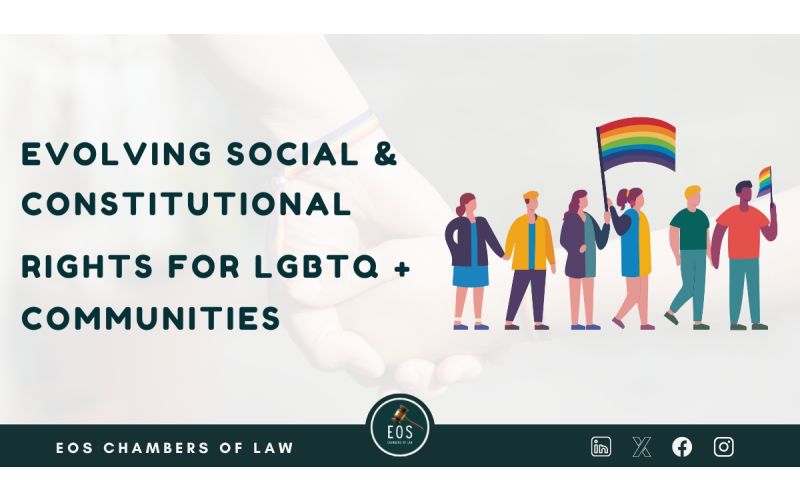The Supreme Court’s Ruling on Same-Sex Marriage: What’s

The Supreme Court’s Ruling on Same-Sex Marriage: What’s Next?
As legal professionals, we recognize the profound implications of the Supreme Court of India's recent deliberations on same-sex marriage. While the Court refrained from granting full marriage equality, the discussions have paved the way for significant legal discourse on LGBTQ+ rights in India.
Key Aspects of the Ruling:
- Civil Unions vs. Marriage Equality:
The Supreme Court acknowledged the right to love and partnership for LGBTQ+ individuals but stopped short of recognizing same-sex marriage under existing personal laws. The distinction between civil unions and marriage remains at the heart of the debate. - Call for Legislative Action:
The Court emphasized that changes to marriage laws fall within the purview of Parliament, encouraging the legislature to take proactive steps toward addressing the concerns of the LGBTQ+ community. - Parental and Social Acknowledgment:
An important aspect of the judgment was its focus on parental acceptance and the social challenges faced by LGBTQ+ individuals, urging society to be more inclusive.
Challenges Ahead:
- Recognition in Personal Laws:
The lack of recognition in personal laws such as the Hindu Marriage Act and the Special Marriage Act means that same-sex couples remain excluded from critical rights, including adoption, inheritance, and joint property ownership. - Policy Implementation:
Without legal backing, same-sex partnerships face hurdles in administrative processes like joint bank accounts or nomination rights in insurance and pension schemes. - Cultural Resistance:
Despite progressive judicial pronouncements, societal acceptance remains a significant challenge.
The Way Forward:
- Legislative Advocacy:
As legal practitioners, we urge policymakers to draft inclusive laws that reflect the evolving societal norms. Establishing frameworks for civil unions, if not marriage, could be a critical first step. - Corporate Inclusion:
Businesses can take the lead in promoting LGBTQ+ rights through policies that support workplace equality and benefits for same-sex partners. - Public Awareness Campaigns:
Continued efforts to educate society about LGBTQ+ issues will help foster acceptance and inclusion.
At EOS Chambers, we remain committed to advocating for equal rights and providing legal support to marginalized communities. The Supreme Court’s ruling has initiated an important conversation, but the journey toward equality requires collaborative efforts from all stakeholders.
Together, let’s work toward a future where love, dignity, and equality prevail.
Post Categories
Featured Posts
Latest Posts
Latest Posts

Corporate Social Responsibility and Legal Obligations - Navigating the Legal Aspects of CSR Initiatives...
Corporate Social Responsibility CSR has evolved from a voluntary initiative to a crucial component of modern business strategy In today's globalized economy companies are expected to contribute positively to society while maintaining profitability However CSR is not just about corporate...

Supreme Court Stays High Court Order On Old Pension Scheme For Paramilitary Forces...
The Supreme Court on Friday stayed the Delhi High Court judgment which held that the old pension scheme OPS will be implemented in the Central Paramilitary Forces CAPF During a brief hearing a bench of Justices Sanjeev Khanna and Bela...

Delhi pollution Supreme Court seeks report from Centre's air quality panel...
The Supreme Court on Tuesday sought a report from the Commission for Air Quality Management CAQM on the steps being taken to control air pollution in and around Delhi The Supreme Court on Tuesday sought a report from the Commission...

Evolving Social and Constitutional Rights for LGBTQ Communities...
The journey toward equality for LGBTQ communities in India has been marked by significant legal and social milestones From the decriminalization of same-sex relationships to ongoing debates about marriage equality and adoption rights the evolution of LGBTQ rights reflects the...

E-Courts The Future of Judiciary in India...
India rsquo s judiciary is at a crossroads with digitization and judicial reforms paving the way for increased efficiency transparency and accessibility The e-Courts initiative launched by the Indian judiciary under the National e-Governance Plan NeGP is a transformative step...

Speak With Our
Get a Appointment

















